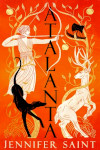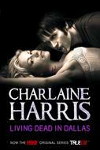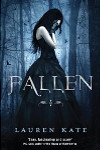Danielle Trussoni – Angelology
Posted 19th May 2011
Category: Reviews Genres: 2010s, Fantasy, Theological
2 Comments
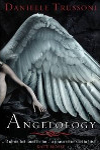
The Bible speaks briefly of the Nephilim, but what if they deserved a lot more words than they were given?
Publisher: Michael Joseph (Penguin)
Pages: 452
Type: Fiction
Age: Adult
ISBN: 978-0-718-15558-2
First Published: 2010
Date Reviewed: 19th April 2011
Rating: 3/5
Evangeline has always led a routine existence; as a nun she looks after the mail and devotes her time to prayer. But all that changes when a man arrives seeking information about a past Mother Superior. Verlaine is working for a tall blond who surpasses human averages by far, someone who isn’t about to let him do his job alone.
Angelology is the first book in a new trilogy written by Trussoni that examines the possibility of evil angels walking the earth. In it she links historic events to these human-angel hybrids and creates a whole educational system for the suppression of them.
Something that I feel is important to impart to the potential reader is the amount of background information included, indeed a large chunk of the book is dedicated to an event that happened over fifty years before. In this Trussoni blends fact with fiction and some sections are extremely interesting but one can feel bogged down especially as you can’t exactly take much of the information away with you for use in everyday life.
The way in which Trussoni goes about telling her tale is at once brilliant and ridiculous. The brilliance comes in the form of such things as drawing a subtle link between the physic of the Nephilim and the dictate of the Nazis on the perfect Aryan. The ridiculous comes in the form of such things as human agents in a secret society working against Nephilim, who want to kill them, having “angel1”, and “angel2” as their car number plates.
Unfortunately it is this second element that dominates the book, and it’s not until the end that things pick up. One character obviously sees a Nephilim, sees their wings, but it isn’t until someone else tells her much later on that she realises it was a Nephilim she saw. Add to this the fact that Trussoni constantly tells us that this character is the brightest student and, well, you can see where this is going.
The characters are not particularly developed, and the sort-of main character, Evangeline, supposedly the heroine, only gets things done because she has people telling her what to do. That she is a major factor in the Angelology circle is peculiar.
There is an issue with language and the book in relation to international audiences. Trussoni talks often of Verlaine’s “wing-tips”. On doing research, I discovered that this is the American phrase for a type of shoe, but even so, it’s really not the best way she could have described them when her book is about winged creatures.
The saving grace of the story is the ending, where Trussoni finally takes the plunge and delivers some top-notch plot ideas. The pacing and variation do make up a lot for the prior 300 or so pages, but unless you are happy to stick with a very average book until the end you are likely to deem it not worth it and that would be entirely understandable.
If you want to read Angelology proceed with caution, and I would recommend having a second book to hand for times when things get silly.
Related Books
Sarah Haynes – Things He Never Knew
Posted 13th May 2011
Category: Reviews Genres: 2010s, Chick-Lit, Domestic
1 Comment

If you live with a lie in your life, that day of truth will surely come.
Publisher: Olympia Publishers
Pages: 275
Type: Fiction
Age: Adult
ISBN: 978-1-848-97089-2
First Published: 2010
Date Reviewed: 11th May 2011
Rating: 4.5/5
Steph’s life is picture perfect; a beautiful house, a loving husband, gorgeous twin girls, and enough money for good food and fashionable clothing. But the image is deceiving, for behind it lurks a woman who isn’t quite satisfied with being a housewife – although she realises how nice a position she is in – and something else. What her husband doesn’t know is that their twins aren’t his, the product of a one-night stand with their mutual best friend, Ed. Steph never knew how to tell Theo, and couldn’t tell Ed, and now ten years have gone by. But it won’t end there.
Things He Never Knew is the debut novel of Haynes and categorising it is difficult. On the one hand you have a sort of chick-lit book, an easy read that I found provoked in me similar feelings of comfort I get when reading an Adele Parks or Lisa Jewell, but the subject matter and the handling of it move it away from the genre to provide more of a harder look into a tough situation.
At the beginning there is a great amount of dialogue in this story where a lot of times description might have been better than discussion but as the story progresses this slowly disappears and Haynes comes into her own.
The story is well thought out, whenever you think that you might have found a gap in a character’s reasoning it takes only a few more lines, at best a few paragraphs, for that gap to be filled. Indeed there are a few places where the reader may consider that Haynes has taken the easy route to create more drama, particularly near the end – but in actual fact these elements are used in order to develop the characters further and explore the domestic aspects and relationships. And it all works rather well.
The narrative flows finely and if you’re looking for a book that will keep you entertained while providing you with something to think about, as well as being impossible to put down, Things He Never Knew is the ideal candidate. Haynes’s references are often firmly based in British life but due to the relative wealth of the characters there are a lot of international references too. This makes the book simple to relate to.
Naturally the character that springs to mind as most developed is Steph, who has to re-evaluate everything she’s done and then try to piece together a life that is appropriate – but Theo’s development is of great importance. One only needs to be aware of the basic plot to know that everything will hang on him, and his progression as a person may surprise you. Haynes is neither harsh nor does she treat the characters with kid gloves; she feels for all of them and looks at the issues from an objective viewpoint. She writes in the way of a historian evaluating all the evidence before coming to a conclusion. And the conclusion may be hers but you never get the sense that she is preaching an opinion, her choices are for the characters she’s created. Julia’s participation in the story takes the narrative down a different road than you might have been expecting.
Of course one could not write about this book without looking directly at the subject at hand. In an era when people are openly bringing up children who aren’t their own, adoption aside, you have to question motives and look at the arguments with a clear contemporary mindset. But you also need to think back to the past because the book places both personal history (which has links to social history) right alongside present day culture and finds a resolution between them.
Whether or not you agree with the choices Steph makes or the way in which the issues are resolved is something for you to decide, because obviously it is not the only possible conclusion, and a good effort is made to look at the issues from a range of angles. The close and careful look into each person’s mindset allows you to understand why these choices are made.
Is this a book for chick-lit lovers or readers of fiction overall? This reader would say it fits both categories near enough equally and that there is something for everyone inside its cover. And if the third category concerns recommendation then yes, I most certainly recommend it.
Related Books
Charlaine Harris – Dead Until Dark
Posted 10th May 2011
Category: Reviews Genres: 2000s, Comedy, Mystery, Paranormal, Romance
Comments Off on Charlaine Harris – Dead Until Dark

Elvis isn’t dead, but unlike the band Scouting For Girls who say that it’s because they heard him on the radio, Harris has seen him in person.
Publisher: Gollancz (Orion Books)
Pages: 326
Type: Fiction
Age: Adult
ISBN: 978-0-575-08936-5
First Published: 2001
Date Reviewed: 4th May 2011
Rating: 3.5/5
Sookie Stackhouse can read minds and is met with caution by most people. She could date, heck there are enough guys about who would like to take her out, but the idea of knowing what they want to do in the bedroom beforehand makes desire an endangered species. When Bill walks into the bar Sookie hears nothing, and that makes him a possibility. Except that Bill’s a vampire – except that doesn’t matter. Vampires are an accepted minority now, after all, and her grandmother certainly approves. But then women start being murdered and Sookie isn’t sure of anything.
This was pretty exotic stuff for a telepathic barmaid from northern Louisiana.
Dead Until Dark is nothing like the cover suggests. Well, ok, there is some blood, obviously, but it’s actually a pretty quirky book and at times hilariously funny. Harris has created a world where vampires are slowly being accepted into mainstream society, and the name of the hero himself, Bill, should give you a good idea of the angle she takes on the whole fantasy element.
The style of writing is rather different and although it fits the book I found it difficult to get used to. Sookie is the narrator and her voice is very unique. In due course you discover that the style is something Harris has constructed specifically to aid the comedy and strength of the book itself. The emphasis is on short sentences and natural reactions. However the writing is still rather bad and a lot of times I had to re-read a sentence to check if I really ought to have felt so shocked by it – and it turned out that yes, I should have.
He was unconscious or dead. With a vampire it was hard to tell the difference.
Because of the style of writing you get a real sense of how Sookie feels, in fact if I were to meet her and tell her that she’d probably say “well you don’t say” – in other words she’s very casual, very open, and more personal than if she were writing a diary; however she is also very naïve about some things to the point of it being silly. Bill is good to read about mostly because of Sookie’s descriptions, but also because of his efforts to be as human as possible.
Vampires aren’t the only paranormal creatures in this book. I’ll just say that if someone told me Stephenie Meyer studied this series before she wrote hers I wouldn’t be surprised. But unlike Meyer, Harris is compelled by humour and because of the age of the characters, and the situation, it’s a lot more fun to read. There’s a reality, almost, that Meyer didn’t reach.
One of the themes is romance but the other major theme, mystery, and the genre of comedy, mean that the narrative never slows down. The mystery is well planned and the importance given to it stays the same throughout.
Make no mistakes, this is more horrific than most paranormal books released in our current era, as, might I say, most pre-Meyers are, but the light-heartedness makes it an ok choice for most adults – be aware that this is very much an adult book and some of the subplots and the sex are not for younger readers.
Dead Until Dark has its flaws and is maybe a little too easy a read at times but if you are up for the challenge of story surpassing, by far, the writing, then I’d give it a go. Just make sure you read it where the idea of someone reading a book with a bloodthirsty cover while laughing their head off would be acceptable.
Related Books
Lauren Oliver – Delirium
Posted 4th May 2011
Category: Reviews Genres: 2010s, Romance, Science Fiction
1 Comment
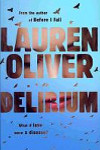
The only thing worse than love or hate is indifference.
Publisher: Hodder & Stoughton
Pages: 393
Type: Fiction
Age: Young Adult
ISBN: 978-0-340-98091-0
First Published: 1st February 2011
Date Reviewed: 1st April 2011
Rating: 5/5
Lena has grown up in a world where love is treated as a disease and everyone must undergo a procedure around 18 years of age in order to eradicate it. She’s been looking forward to becoming an adult for a long time. Then she meets Alex.
Whereas Before I Fall was a very good book exploring social relationships and the mind, Delirium is a brilliant book that takes it one step further.
It may appear to you at first glance, as it did to me, that the love discussed in the book is romantic love. It is, but it’s also every other kind of love out there. Therefore a constant wish of Lena’s is that her family members might hug her like they used to before they had their procedures. The procedure basically means that people don’t care anymore, children could hurt themselves but their parents wouldn’t bat an eyelid other than to soak up any blood for purely hygienic reasons. This is what makes Delirium so difficult to read. The government says that getting rid of love stops pain, but of course for the children it causes it, having to live with parents who aren’t much better than zombies.
It is a horrific thing to think about, a world without love, but it takes Oliver’s careful and deep examination to really show us what such a world would be like and how important love truly is. Without any affection, any feelings, the minor characters simply go about spouting rules and often have trouble trying to think of what to say to a family member. Without any affection the people in charge have no problems bludgeoning resisters to death.
A world without fear. Impossible.
Lena’s development obviously rests on her discovery that all the things she’s been taught are lies. The catalyst here is the introduction of Alex, an outsider, the boy she falls in love with. When he tells her there are no rules, meaning to their race across the sand but the subtext being about his own outsider life, Oliver clearly means it as an early sign to her heroine.
Something that’s interesting is the amount of hatred shown by the governmental groups. One can’t help wondering why they didn’t get rid of hate as well – but maybe that’s the point because as Oliver shows, hate leads to fear and thus control. The government workers can threaten, can kill, indiscriminately. The perfect world is not really perfect at all.
I found Delirium to be as much a dystopian tale as a parable for today. We are given so many rules and things such as CCTV that we’re told are for our protection, but are they really? Don’t they just allow people to spy on us and find out everything, things they shouldn’t really know? In addition to this I found a connection between the way outsiders and resisters are treated and how, until recently and even still sometimes today, mental health patients are treated.
That’s the irony of it. She’s looking at me like I’m the crazy one, the dangerous one. Meanwhile the guy downstairs […] is the savior.
The love is forbidden, a great love story set in the future. It’s well written and delved into without ever being too much or unbelievable. The hero himself is the backup to Oliver’s statements.
Delirium demonstrates just how much we value love in this world, and shows how everything we do would change if it did not exist, would change in ways we might not have thought of. Not only is it a brilliant book, it’s a valuable lesson.
Related Books
Lauren Kate – Torment
Posted 26th April 2011
Category: Reviews Genres: 2010s, Paranormal, Romance
Comments Off on Lauren Kate – Torment

Daniel leaves Luce just as Edward leaves Bella, but at least Daniel comes back many times throughout the book.
Publisher: Doubleday (Random House)
Pages: 452
Type: Fiction
Age: Young Adult
ISBN: 978-0-385-61809-0
First Published: 28th September 2010
Date Reviewed: 23rd January 2011
Rating: 2.5/5
Even if I absolutely hate a book, I’m always willing to give the author a second chance. This was Kate’s chance to prove herself, however I was constantly considering abandoning Torment because for the most part it remained just as bad as Fallen.
Daniel takes Luce to the other side of America where she enrols at a school that’s at the opposite end of the spectrum to Sword & Cross. Told to stay there for her protection, Luce makes friends with Nephilim and attends lessons taught by fallen angels. Meanwhile Daniel and Cam work to stop the new common enemy from kidnapping her. But Luce is unlikely to stay put all the time, especially as she wants to learn more about her past lives.
The biggest problem with Fallen, to my mind, was that there was no reasoning to the love story. Luce just trusted Daniel when he harped on about her past lives – she never questioned it – which is why it’s good that Kate finally has her thinking about those lives in Torment. However a lot more could have been done. Luce delves into the past but she still doesn’t contemplate why she loves Daniel, it’s still the case that she’s been told she does and so that’s why she does. And there is a more general reason for this:
The relationship between them is severely underdeveloped. If Luce and Daniel had just a quick fling it would be ok to not know about them, but considering theirs is supposed to be a relationship spanning thousands of years, one requires more information than simply what they feel about each other’s physical appearance. Luce is as dull as a milk bottle. She does appear to have an interest, swimming, but it’s rarely addressed and thus causes you to wonder if she really enjoys it. Kate does ultimately addresses this, albeit accidentally:
“I don’t want you to be anyone other than who you are.”
“Which is who, Daniel? Because if you know the answer to that, feel free to clue me in.”
Following on from this, one must ask why there is such a big deal made over this particular relationship when Luce is going to a school full of children who are the product of human/angel couplings – why aren’t those parents being blasted too? Kate says somewhere in the middle of the book that it’s because Daniel is the angel whose future choice between good or evil is the one that will tip the scales and is therefore the most important, but again she provides no reasons. She says Daniel was an important angel, but unless she is going to purposefully yank the well-known archangels from their seats to create an ever more fictional story then he is of no significance.
It takes until the end of the book for Luce to finally start enjoying herself because otherwise, every time she thinks she might be, she reminds herself that Daniel isn’t there. The end of this book suggests that Luce might actually grow some balls in the next, which would be a very belated relief.
The vast majority of this book is terrible and it’s apparent that little to no research has been conducted. It reads like a cheesy fan-fiction, as an outline for a story rather than the story itself, and Kate appears to have no idea about grammar and word usage.
So here is where I explain why I’ve not given the book a zero. It takes until past the halfway mark for the story to start improving, but I’m pleasantly surprised to say that although it’s not Austen, a change in scenery makes up for a lot. Kate shows that she does have a bit of an imagination. At length she wrenches herself away from her Stephenie Meyer backbone and includes some interesting action. She shows what she can be if she creates her own mould.
I’m struggling with the notion that scholarship pupils pay their way by waiting on the other pupils at breakfast, and that a publishing house will, in this day and age, allow an author to keep a highly offensive paragraph calling a stumbling person a spaz and describing why they are so, but at least there is an improvement to the series.
Will I read the third book? I can’t say. I’m reluctant, because I don’t think Kate will carry the story as well as the opportunity has presented it. Would I recommend a person to read Fallen because Torment gets better? No. But if, like me, you invested your time in Fallen, you may feel better about it if you continue onto Torment.
Kate has proved that she has the ability to be better than she was and that her series might be going somewhere. Hopefully she will include in that a lesson in computing so that next time Luce sends an email, she doesn’t send it twice.











